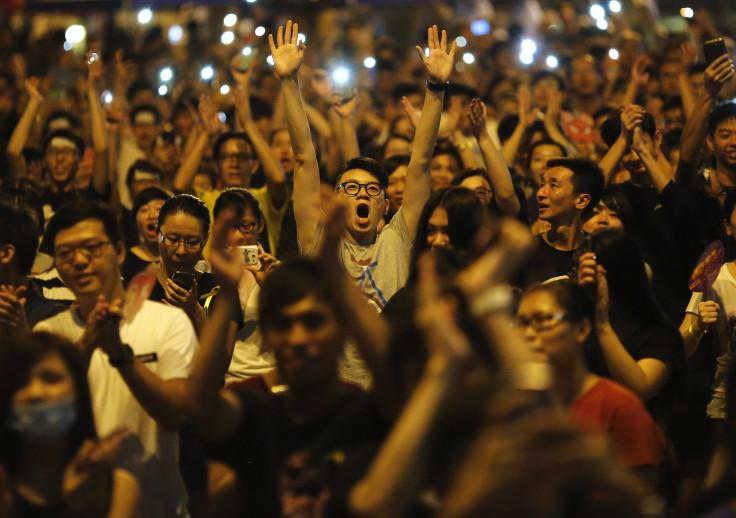Hong Kong Protests: China Warns of 'Unimaginable' Consequences In Editorial Similar To Tiananmen Crackdowns

The Chinese government has warned Hong Kong’s pro-democracy protesters of “unimaginable” consequences if the Occupy Central demonstrations continue. The warning came Wednesday via an editorial in People’s Daily, a government-run newspaper, and echoes an editorial published in the same newspaper ahead of the government’s violent crackdown on the Tiananmen Square pro-democracy protests in 1989.
Portions of the editorial published Wednesday said the demonstrators have “incited the public, paralyzed transportation, disrupted businesses… and interfered with the daily lives of Hong Kong people” and should “bear the legal responsibilities for their illegal activities,” according to Quartz. The unsigned editorial goes on to ask Hong Kong residents to support police working to quell Occupy Central.
“In Hong Kong, there is freedom of speech, so if anyone disagrees with the Chinese central government's decision, they can use legal channels to communicate and appeal, instead of using extreme measures like Occupy Central,” the editorial said. ”Occupy Central isn't about communication; it's about confrontation. Now a few insist on confronting the law, inciting incidents. They'll end up paying for their actions.”
The editorial does not name any specific consequences, but according to a Wall Street Journal report quoting an anonymous source, Beijing told Hong Kong’s Chief Executive Leung Chun-ying that he must stop the protests without force. “Beijing has set a line to [Leung]. You cannot open fire; you must halt it in a peaceful way,” the source said.
The Wall Street Journal said China’s strategy is to allow demonstrations to go on until they become a nuisance and public opinion shifts against them, at which point authorities can regain control of the streets without angering the Hong Kong public.
The organizers behind Occupy Central want Leung to step down by Thursday, but Leung and Beijing refuse. The Hong Kong government signaled on Wednesday it was ready to talk with protesters, but only if they dropped the demand that Leung leave office.
A number of state-aligned news outlets have run similar stories criticizing the protests as “illegal” and “out of control.” Others have limited coverage to the statements by Hong Kong officials and stories highlighting the public disturbance caused by the thousands of protesters occupying Hong Kong streets.
China ramped up its censorship campaign this week as protests began to grab international and domestic attention. The popular photo-sharing platform Instagram was blocked in China and photos of the protests on China’s Weibo platform went missing. Weibo users are unable to search phrases like “Occupy Central” and “Hong Kong students,” according to BBC.
© Copyright IBTimes 2024. All rights reserved.






















